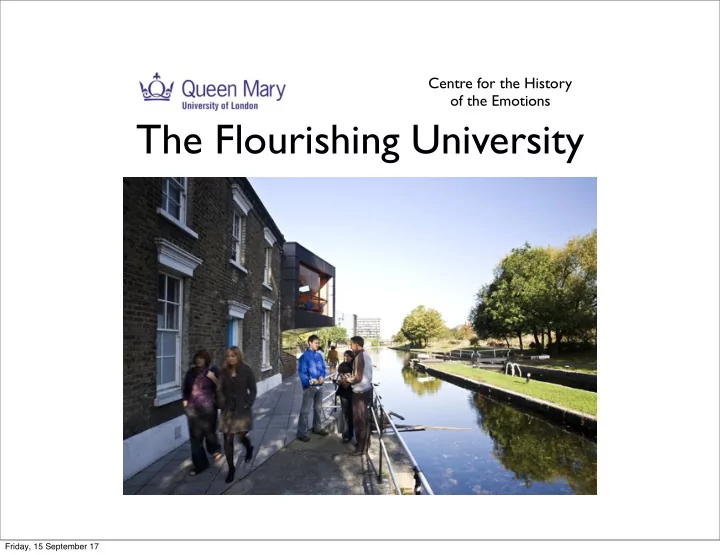

Centre for the History of the Emotions The Flourishing University Friday, 15 September 17
‘Crisis on campus’ in student mental health? Friday, 15 September 17
Should the response be simply ‘more counselling’? This makes well-being something peripheral to the university’s main focus of research and teaching Friday, 15 September 17
Some UK universities trying to make well-being / flourishing a more central part of their strategy (as it often is in US universities) Friday, 15 September 17
“The #stepchange in student mental health begins with higher education leaders adopting mental health as a strategic imperative.” (Universities UK, 9/17) “Universities should make the issue a strategic priority and adopt a ‘whole- university’ approach based on prevention and promotion” (IPPR 9/2017) Friday, 15 September 17
29% of universities have a ‘well-being strategy’ 43% offer content / courses on well-being Friday, 15 September 17
Friday, 15 September 17
The idea that one of HE’s mission is ‘flourishing’ is not entirely new Friday, 15 September 17
Academy / Lyceum (c.400BC) tried to create an askesis for wisdom and healing Friday, 15 September 17
From the Middle Ages to mid-19th century, one of the main aims of HE was to develop Christian character ‘Wisdom’s workshops’ Pope Gregory IX Friday, 15 September 17
Liberal Protestant universities became more secular and research-focused from mid C19. But they still tried to foster ‘character’, ‘virtue’ ‘flourishing’ or ‘ bildung ’ ‘The moral purpose of a university should be to train young men...The whole work is uplifting, refining, spiritualizing’ (Charles Eliot, Harvard president) Friday, 15 September 17
Some American universities still aspire to that mission Friday, 15 September 17
Rise of the Multiversity since 1960s - who pays for mass higher education? what’s it meant to do? is it succeeding? - much larger and more diverse student body; harder to agree on ‘core curriculum’ Friday, 15 September 17
Liberal arts ideal out-dated? - Since 1970, % of students who rate ‘being very well off’ as ‘very important’ has risen from 36.2% to 73.6%, while those who attach similar importance to ‘acquiring a meaningful philosophy of life’ has fallen from 79% to 39.6%.’ Friday, 15 September 17
Problems with UK universities’ well-being strategies - they can be simplistic, instrumental, scientistic and illiberal (we the scientists can define and measure well-being) - they can over-individualize well-being and ignore socio-economic conditions (your well-being is your responsibility) - they can focus on one group (students) and not others (staff, faculty, society) - they can be window-dressing - lack of data: we don’t know what’s the problem or what works as a solution Friday, 15 September 17
Building a ‘whole university’ approach is hard So many different individuals, departments, relationships, agendas...Westeros is basic in comparison! Friday, 15 September 17
A good HE well-being strategy might balance... research / practice sciences / art & humanities techniques / values quantitative / qualitative evidence online / offline staff / students / wider society high-level support with input from every other level well-being / discomfort Friday, 15 September 17
Aims of today • Consider HE wellbeing from multidisciplinary perspectives • Help ourselves and each other in our work • Foster a research network / blog / essays • Enjoy ourselves Friday, 15 September 17
Recommend
More recommend